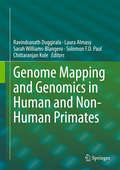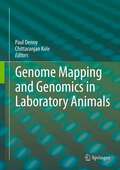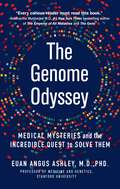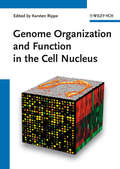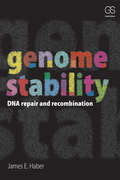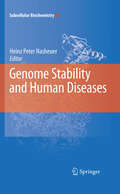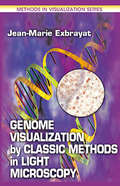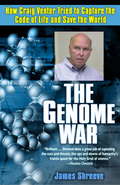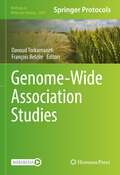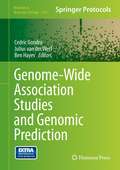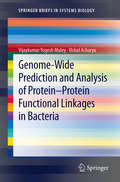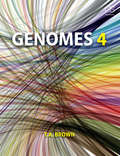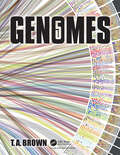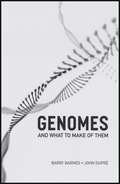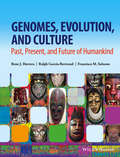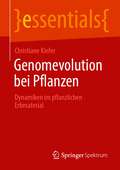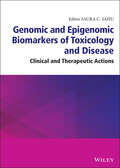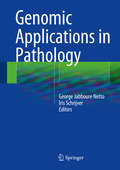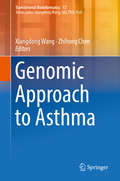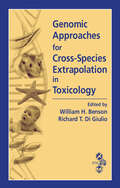- Table View
- List View
Genome Mapping and Genomics in Human and Non-Human Primates
by Ravindranath Duggirala Laura Almasy Sarah Williams-Blangero Solomon F.D. Paul Chittaranjan KoleThis book provides an introduction to the latest gene mapping techniques and their applications in biomedical research and evolutionary biology. It especially highlights the advances made in large-scale genomic sequencing. Results of studies that illustrate how the new approaches have improved our understanding of the genetic basis of complex phenotypes including multifactorial diseases (e. g. , cardiovascular disease, type 2 diabetes, and obesity), anatomic characteristics (e. g. , the craniofacial complex), and neurological and behavioral phenotypes (e. g. , human brain structure and nonhuman primate behavior) are presented. Topics covered include linkage and association methods, gene expression, copy number variation, next-generation sequencing, comparative genomics, population structure, and a discussion of the Human Genome Project. Further included are discussions of the use of statistical genetic and genetic epidemiologic techniques to decipher the genetic architecture of normal and disease-related complex phenotypes using data from both humans and non-human primates.
Genome Mapping and Genomics in Laboratory Animals
by Chittaranjan Kole Paul DennyMapping of animal genomes has generated huge databases and several new concepts and strategies, which are useful to elucidate origin, evolution and phylogeny. Genetic and physical maps of genomes further provide precise details on chromosomal location, function, expression and regulation of academically and economically important genes. The series Genome Mapping and Genomics in Animals provides comprehensive and up-to-date reviews on genomic research on a large variety of selected animal systems, contributed by leading scientists from around the world. Laboratory animals are those species that by accident of evolution, domestication and selective breeding are amenable to maintenance and study in a laboratory environment. Many of these species are studied as 'models' for the biology and pathology of humans. Laboratory animals included in this volume are sea-urchin, nematode worm, fruit fly, sea squirts, puffer fishes, medaka fish, African clawed frog, mouse and rat.
The Genome Odyssey: Medical Mysteries and the Incredible Quest to Solve Them
by Dr. Euan Angus AshleyIn The Genome Odyssey, Dr. Euan Ashley, Stanford professor of medicine and genetics, brings the breakthroughs of precision medicine to vivid life through the real diagnostic journeys of his patients and the tireless efforts of his fellow doctors and scientists as they hunt to prevent, predict, and beat disease.Since the Human Genome Project was completed in 2003, the price of genome sequencing has dropped at a staggering rate. It’s as if the price of a Ferrari went from $350,000 to a mere forty cents. Through breakthroughs made by Dr. Ashley’s team at Stanford and other dedicated groups around the world, analyzing the human genome has decreased from a heroic multibillion dollar effort to a single clinical test costing less than $1,000. For the first time we have within our grasp the ability to predict our genetic future, to diagnose and prevent disease before it begins, and to decode what it really means to be human.In The Genome Odyssey, Dr. Ashley details the medicine behind genome sequencing with clarity and accessibility. More than that, with passion for his subject and compassion for his patients, he introduces readers to the dynamic group of researchers and doctor detectives who hunt for answers, and to the pioneering patients who open up their lives to the medical community during their search for diagnoses and cures. He describes how he led the team that was the first to analyze and interpret a complete human genome, how they broke genome speed records to diagnose and treat a newborn baby girl whose heart stopped five times on the first day of her life, and how they found a boy with tumors growing inside his heart and traced the cause to a missing piece of his genome.These patients inspire Dr. Ashley and his team as they work to expand the boundaries of our medical capabilities and to envision a future where genome sequencing is available for all, where medicine can be tailored to treat specific diseases and to decode pathogens like viruses at the genomic level, and where our medical system as we know it has been completely revolutionized.
Genome Organization And Function In The Cell Nucleus
by Karsten RippeBy way of its clear and logical structure, as well as abundant highresolution illustrations, this is a systematic survey of the players and pathways that control genome function in the mammalian cell nucleus. As such, this handbook and reference ties together recently gained knowledge from a variety of scientific disciplines and approaches, dissecting all major genomic events: transcription, replication, repair, recombination and chromosome segregation. A special emphasis is put on transcriptional control, including genome-wide interactions and non-coding RNAs, chromatin structure, epigenetics and nuclear organization. With its focus on fundamental mechanisms and the associated biomolecules, this will remain essential reading for years to come.
Genome-Scale Algorithm Design: Biological Sequence Analysis in the Era of High-Throughput Sequencing
by Veli Mäkinen Djamal Belazzougui Fabio Cunial Alexandru I. TomescuHigh-throughput sequencing has revolutionised the field of biological sequence analysis. Its application has enabled researchers to address important biological questions, often for the first time. This book provides an integrated presentation of the fundamental algorithms and data structures that power modern sequence analysis workflows. The topics covered range from the foundations of biological sequence analysis (alignments and hidden Markov models), to classical index structures (k-mer indexes, suffix arrays and suffix trees), Burrows-Wheeler indexes, graph algorithms and a number of advanced omics applications. The chapters feature numerous examples, algorithm visualisations, exercises and problems, each chosen to reflect the steps of large-scale sequencing projects, including read alignment, variant calling, haplotyping, fragment assembly, alignment-free genome comparison, transcript prediction and analysis of metagenomic samples. Each biological problem is accompanied by precise formulations, providing graduate students and researchers in bioinformatics and computer science with a powerful toolkit for the emerging applications of high-throughput sequencing.
Genome Stability: DNA Repair and Recombination
by James HaberGenome Stability: DNA Repair and Recombination describes the various mechanisms of repairing DNA damage by recombination, most notably the repair of chromosomal breaks. The text presents a definitive history of the evolution of molecular models of DNA repair, emphasizing current research. The book introduces the central players in recombination. An overview of the four major pathways of homologous recombinational repair is followed by a description of the several mechanisms of nonhomologous end-joining. Designed as a textbook for advanced undergraduate and graduate students with a molecular biology and genetics background, researchers and practitioners, especially in cancer biology, will also appreciate the book as a reference.
Genome Stability and Human Diseases
by Heinz-Peter NasheuerSince the establishment of the DNA structure researchers have been highly interested in the molecular basis of the inheritance of genes and of genetic disorders. Scientific investigations of the last two decades have shown that, in addition to oncogenic viruses and signalling pathways alterations, genomic instability is important in the development of cancer. This view is supported by the findings that aneuploidy, which results from chromosome instability, is one of the hallmarks of cancer cells. Chromosomal instability also underpins our fundamental principles of understanding tumourigenesis: It thought that cancer arises from the sequential acquisition of genetic alterations in specific genes. In this hypothesis, these rare genetic events represent rate-limiting 'bottlenecks' in the clonal evolution of a cancer, and pre-cancerous cells can evolve into neoplastic cells through the acquisition of somatic mutations. This book is written by international leading scientists in the field of genome stability. Chapters are devoted to genome stability and anti-cancer drug targets, histone modifications, chromatin factors, DNA repair, apoptosis and many other key areas of research. The chapters give insights into the newest development of the genome stability and human diseases and bring the current understanding of the mechanisms leading to chromosome instability and their potential for clinical impact to the reader.
Genome Visualization by Classic Methods in Light Microscopy (Methods in Visualization)
by Jean-Marie ExbrayatVisualization of nucleic acids has become indispensable to studying cells, tissues, and organisms. Certain techniques even permit quantification of DNA and/or RNA distribution in tissues, but few current analytical books cover the numerous methods for DNA and RNA visualization. This book provides insight into several classic techniques, histologica
The Genome War
by James ShreeveThe long-awaited story of the science, the business, the politics, the intrigue behind the scenes of the most ferocious competition in the history of modern science--the race to map the human genome.On May 10, 1998, biologist Craig Venter, director of the Institute for Genomic Research, announced that he was forming a private company that within three years would unravel the complete genetic code of human life--seven years before the projected finish of the U.S. government's Human Genome Project. Venter hoped that by decoding the genome ahead of schedule, he would speed up the pace of biomedical research and save the lives of thousands of people. He also hoped to become very famous and very rich. Calling his company Celera (from the Latin for "speed"), he assembled a small group of scientists in an empty building in Rockville, Maryland, and set to work.At the same time, the leaders of the government program, under the direction of Francis Collins, head of the National Human Genome Research Institute at the National Institutes of Health, began to mobilize an unexpectedly unified effort to beat Venter to the prize--knowledge that had the potential to revolutionize medicine and society. The stage was set for one of the most thrilling--and important--dramas in the history of science. The Genome War is the definitive account of that drama--the race for the greatest prize biology has had to offer, told by a writer with exclusive access to Venter's operation from start to finish. It is also the story of how one man's ambition created a scientific Camelot where, for a moment, it seemed that the competing interests of pure science and commercial profit might be gloriously reconciled--and the national repercussions that resulted when that dream went awry.From the Hardcover edition.
The Genome War
by James ShreeveThe long-awaited story of the science, the business, the politics, the intrigue behind the scenes of the most ferocious competition in the history of modern science--the race to map the human genome.On May 10, 1998, biologist Craig Venter, director of the Institute for Genomic Research, announced that he was forming a private company that within three years would unravel the complete genetic code of human life--seven years before the projected finish of the U.S. government's Human Genome Project. Venter hoped that by decoding the genome ahead of schedule, he would speed up the pace of biomedical research and save the lives of thousands of people. He also hoped to become very famous and very rich. Calling his company Celera (from the Latin for "speed"), he assembled a small group of scientists in an empty building in Rockville, Maryland, and set to work.At the same time, the leaders of the government program, under the direction of Francis Collins, head of the National Human Genome Research Institute at the National Institutes of Health, began to mobilize an unexpectedly unified effort to beat Venter to the prize--knowledge that had the potential to revolutionize medicine and society. The stage was set for one of the most thrilling--and important--dramas in the history of science. The Genome War is the definitive account of that drama--the race for the greatest prize biology has had to offer, told by a writer with exclusive access to Venter's operation from start to finish. It is also the story of how one man's ambition created a scientific Camelot where, for a moment, it seemed that the competing interests of pure science and commercial profit might be gloriously reconciled--and the national repercussions that resulted when that dream went awry.From the Hardcover edition.
The Genome War: How Craig Venter Tried to Capture the Code of Life and Save the World
by James ShreeveBiologist Craig Venter founded the company Celera in an effort to decode the human genome before the U. S. government's Human Genome Project, expecting to get very rich in the process. This book chronicles the company's work in the 1990s, looking at the economic, political, scientific, and institutional rivalries and competitions that eventually led to the company's eventual implosion. Annotation ©2004 Book News, Inc. , Portland, OR (booknews. com)
Genome-Wide Association Studies
by Scherer, Stephen W. and Appasani, Krishnarao Visscher, Peter M. Krishnarao Appasani Stephen W. Scherer Peter M. VisscherOver the last twenty years, genome-wide association studies (GWAS) have revealed a great deal about the genetic basis of a wide range of complex diseases and they will undoubtedly continue to have a broad impact as we move to an era of personalised medicine. This authoritative text, written by leaders and innovators from both academia and industry, covers the basic science as well as the clinical, biotechnological and pharmaceutical potential of these methods. With special emphasis given to highlighting pharmacogenomics and population genomics studies using next-generation technology approaches, this is the first book devoted to combining association studies with single nucleotide polymorphisms, copy number variants, haplotypes and expressed quantitative trait loci. A reliable guide for newcomers to the field as well as for experienced scientists, this is a unique resource for anyone interested in how the revolutionary power of genomics can be applied to solve problems in complex disease.
Genome-Wide Association Studies (Methods in Molecular Biology #2481)
by Davoud Torkamaneh François BelzileThis detailed collection explores genome-wide association studies (GWAS), which have revolutionized the investigation of complex traits over the past decade and have unveiled numerous useful genotype–phenotype associations in plants. The book describes the key concepts and methods underlying GWAS, including the genetic architecture underlying variation for phenotypic traits, the structure of genetic variation in plants, technologies for capturing genetic information, study designs, and the statistical models and bioinformatics tools used for data analysis. Written for the highly successful Methods in Molecular Biology series, chapters include the kind of invaluable implementation advice that leads to the most fruitful research results. Authoritative and practical, Genome-Wide Association Studies serves as an extremely valuable resource for the plant research community by rendering GWAS analysis less challenging and more accessible to a broader group of users.
Genome-Wide Association Studies and Genomic Prediction
by Ben Hayes Cedric Gondro Julius van der WerfWith the detailed genomic information that is now becoming available, we have a plethora of data that allows researchers to address questions in a variety of areas. Genome-wide association studies (GWAS) have become a vital approach to identify candidate regions associated with complex diseases in human medicine, production traits in agriculture, and variation in wild populations. Genomic prediction goes a step further, attempting to predict phenotypic variation in these traits from genomic information. Genome-Wide Association Studies and Genomic Prediction pulls together expert contributions to address this important area of study. The volume begins with a section covering the phenotypes of interest as well as design issues for GWAS, then moves on to discuss efficient computational methods to store and handle large datasets, quality control measures, phasing, haplotype inference, and imputation. Later chapters deal with statistical approaches to data analysis where the experimental objective is either to confirm the biology by identifying genomic regions associated to a trait or to use the data to make genomic predictions about a future phenotypic outcome (e.g. predict onset of disease). As part of the Methods in Molecular Biology series, chapters provide helpful, real-world implementation advice.
Genome-Wide Prediction and Analysis of Protein-Protein Functional Linkages in Bacteria
by Vishal Acharya Vijaykumar Yogesh MuleyUsing genome sequencing, one can predict possible interactions among proteins. There are very few titles that focus on protein-protein interaction predictions in bacteria. The authors will describe these methods and further highlight its use to predict various biological pathways and complexity of the cellular response to various environmental conditions. Topics include analysis of complex genome-scale protein-protein interaction networks, effects of reference genome selection on prediction accuracy, and genome sequence templates to predict protein function.
Genomes 4
by T. A. BrownGenomes 4 has been completely revised and updated. It is a thoroughly modern textbook about genomes and how they are investigated. As with Genomes 3, techniques come first, then genome anatomies, followed by genome function, and finally genome evolution. The genomes of all types of organism are covered: viruses, bacteria, fungi, plants, and animals including humans and other hominids. Genome sequencing and assembly methods have been thoroughly revised including a survey of four genome projects: human, Neanderthal, giant panda, and barley. Coverage of genome annotation emphasizes genome-wide RNA mapping, with CRISPR-Cas 9 and GWAS methods of determining gene function covered. The knowledge gained from these techniques forms the basis of the three chapters that describe the three main types of genomes: eukaryotic, prokaryotic (including eukaryotic organelles), and viral (including mobile genetic elements). Coverage of genome expression and replication is truly genomic, concentrating on the genome-wide implications of DNA packaging, epigenome modifications, DNA-binding proteins, non-coding RNAs, regulatory genome sequences, and protein-protein interactions. Also included are applications of transcriptome analysis, metabolomics, and systems biology. The final chapter is on genome evolution, focusing on the evolution of the epigenome, using genomics to study human evolution, and using population genomics to advance plant breeding. Established methods of molecular biology are included if they are still relevant today and there is always an explanation as to why the method is still important. Each chapter has a set of short-answer questions, in-depth problems, and annotated further reading. There is also an extensive glossary. Genomes 4 is the ideal text for upper level courses focused on genomes and genomics.
Genomes 5
by Terry A. BrownGenomes 5 has been completely revised and updated. It is a thoroughly modern textbook about genomes and how they are investigated. As with previous Genomes editions, techniques come first, then genome anatomies, followed by genome function, and finally genome evolution. The genomes of all types of organism are covered: viruses, bacteria, fungi, plants, and animals, including humans and other hominids. Genome sequencing and assembly methods have been thoroughly revised to include new developments in long-read DNA sequencing. Coverage of genome annotation emphasizes genome-wide RNA mapping, with CRISPR-Cas 9 and GWAS methods of determining gene function covered. The knowledge gained from these techniques forms the basis of the chapters that describe the three main types of genomes: eukaryotic, prokaryotic (including eukaryotic organelles), and viral (including mobile genetic elements). Coverage of genome expression and replication is truly genomic, concentrating on the genome-wide implications of DNA packaging, epigenome modifications, DNA-binding proteins, non-coding RNAs, regulatory genome sequences, and protein-protein interactions. Also included are examples of the applications of metabolomics and systems biology. The final chapter is on genome evolutionn, including the evolution of the epigenome, using genomics to study human evolution, and using population genomics to advance plant breeding. Established methods of molecular biology are included if they are still relevant today and there is always an explanation as to why the method is still important. Genomes 5 is the ideal text for upper-level courses focused on genomes and genomics. Key Features A highly accessible and well-structured book with chapters organized into four parts to aid navigation Superb artwork illustrates the key concepts and mechanisms Each chapter has a set of short-answer questions and in-depth problems to test the reader’s understanding of the material Thoroughly up to date with references to the latest research from the 2020s
Genomes and What to Make of Them
by Barry Barnes John Dupré"Genomes and What to Make of Them" opens with a brief history of the science of genetics and genomics, from Mendel to Watson and Crick and all the way up to Craig Venter. From there the authors delve into the use of genomics in determining evolutionary paths -- and what it can tell us, for example, about how far we really have come from our ape ancestors. Barnes and Dupré then consider both the power and risks of genetics, from the economic potential of plant genomes to overblown claims that certain human genes can be directly tied to such traits as intelligence or homosexuality. Ultimately, the authors argue, we are now living with a new knowledge as powerful in its way as nuclear physics, and the stark choices that face us -- between biological warfare and gene therapy, a new eugenics or a new agricultural revolution -- will demand the full engagement of both scientists and citizens.
Genomes, Evolution, and Culture
by Ralph Garcia-Bertrand Rene J. Herrera Francisco M. SalzanoThis book combines recent information and discoveries in the field of human molecular biology and human molecular evolution. It provides an interdisciplinary approach drawing together data from various diverse disciplines to address both the more classical anthropological content and the current more contemporary molecular focus of courses. Chapters include a history of human evolutionary genetics; the human genome structure and function; population structure and variability; gene and genomic dynamics; culture; health and disease; bioethics; future.
The Genomes of Rosaceous Berries and Their Wild Relatives (Compendium of Plant Genomes)
by Timo Hytönen Julie Graham Richard HarrisonThis book collates the most up to date information on Fragaria, and Rubus genomes. It focuses on the latest advances in the model system Fragaria vesca, along with the allied advances in economically important crops. Covering both basic and applied aspects of crop genomics, it illustrates strategies and resources for the study and utilization of genome sequences and aligned functional genomics resources.Rosaceous berries are collectively an increasingly important set of high-value global crops, with a trade value of over £2 billion dollars per annum. The rosaceous berries strawberry, raspberry and blackberry share some common features at the genome scale, namely a range of ploidy levels in each genus and high levels of heterozygosity (and associated inbreeding depression) due to self-incompatibility systems, dioecy, or multispecies hybridization events. Taken together, although the genomes are relatively compact, these biological features lead to significant challenges in the assembly and analysis of berry genomes, which until very recently have hampered the progress of genome-level studies.The genome of the woodland strawberry, Fragaria vesca, a self-compatible species with a homozygous genome was first sequenced in 2011 and has served as a foundation for most genomics work in Fragaria and to some extent Rubus. Since that time, building upon this resource, there have been significant advances in the development of genome sequences for related crop species. This, coupled with the revolution in affordable sequencing technology, has led to a suite of genomics studies on Fragaria and more recently Rubus, which undoubtedly aid crop breeding and production in future years.
Genomevolution bei Pflanzen: Dynamiken im pflanzlichen Erbmaterial (essentials)
by Christiane KieferDie Zellen eines jeden Lebewesens enthalten die Erbinformation in Form von DNA, auch Genom genannt, welche zu einem Großteil Aussehen und Funktion eines Organismus bestimmt. Auch bei Pflanzen ist das nicht anders. Die Erbinformation ist nicht statisch, sondern verändert sich mit großer Dynamik. In diesem essential erhalten Sie einen breiten Überblick über die Prozesse, welche das Pflanzengenom im Laufe der Evolution verändern. Was ist Polyploidie und warum kann sie die Entstehung von Genen mit neuen Funktionen fördern? Warum sind manche Pflanzengenome riesig und andere dagegen winzig, obwohl sie nahezu gleich viele Gene enthalten? Und welche Einblicke gewährt uns das Zeitalter genomischer Studien in die Veränderlichkeit und Flexibilität der Erbsubstanz?
Genomic and Epigenomic Biomarkers of Toxicology and Disease: Clinical and Therapeutic Actions
by Saura C. SahuGenomic and Epigenomic Biomarkers of Toxicology and Disease The latest developments in biomarker research applicable to toxicology and medicine Research on genomic and epigenomic biomarkers is developing rapidly with cutting-edge studies scattered throughout the academic literature, making the status of ongoing scientific activity in this area difficult to ascertain. Genomic and Epigenomic Biomarkers of Toxicology and Disease: Clinical and Therapeutic Actions delivers a comprehensive and authoritative compilation of up-to-date developments in the application of genomic and epigenomic biomarkers to toxicology, disease prevention, cancer detection, therapeutics, gene therapy, and other areas. With contributions from a collection of internationally recognized investigators, this edited volume offers unique insights into current trends and future directions of research in the discussed areas. Combining state-of-the-art information on genomic and epigenomic biomarkers from a range of specialists from around the world, this monograph includes: A thorough introduction to microRNAs as non-invasive biomarkers of toxicity and chemical hazard Comprehensive explorations of extracellular vesicle-associated miRNAs as toxic biomarkers, as well as transcriptomic applications in toxicology and medicine Practical discussions of circulating miRNAs as biomarkers of metal exposure, as well as microRNAs biomarkers of malignant mesothelioma In-depth examinations of the role of noncoding RNAs in innate immune responses perturbed by environmental arsenic with a focus on microRNAs Perfect for researchers, toxicologists, risk assessors, and regulators, Genomic and Epigenomic Biomarkers of Toxicology and Disease: Clinical and Therapeutic Actions will also earn a place in the libraries of graduate students with an interest in biomarkers, toxicology, agriculture, or the environment.
Genomic Applications in Pathology
by George Jabboure Netto Iris SchrijverGenomic Applications in Pathology provides a state-of-the art review of the scientific principles underlying next generation genomic technologies and the required bioinformatics approaches to analyses of the daunting amount of data generated by current and emerging genomic technologies. Implementation roadmaps for various clinical assays such as single gene, gene panels, whole exome and whole genome assays are discussed together with issues related to reporting, including the pathologist's role in interpretation and clinical integration of genomic tests results. Genomic applications for site-specific solid tumors and hematologic neoplasms are detailed, as well as genomic applications in pharmacogenomics, inherited genetic diseases, and infectious diseases. The latest iteration of practice recommendations and guidelines in genomic testing, put forth by stakeholder professional organizations such as the Association for Molecular Pathology and the College of American Pathologists, are also discussed in the volume, as well as regulatory issues and laboratory accreditation related to genomic testing. Written by experts in the field, Genomic Applications in Pathology provides a comprehensive resource that is of great value to practicing molecular pathologists, hematopathologists, other subspecialized pathologists, general pathologists, pathology trainees, oncologists, and geneticists.
Genomic Approach to Asthma (Translational Bioinformatics #12)
by Xiangdong Wang Zhihong ChenThis volume in the series, Translational Bioinformatics, provides an up-to-date overview of genomic approaches to asthma. By applying unbiased “-omics” combined with disease-focused and hypothesis-driven approaches, it enhances readers’ understanding of the asthma endotype. Furthermore, it elucidates how progress in -omics research, such as “genomic,” “transcriptomic,” “protomic,” and “metabolomic,” is applied in asthma, and reports on the related series of important breakthroughs in asthma development, classification, prevention and drug sensitivity. Also covering systems biology knowledge and methodologies, computational models and biostatistical methods to analyze big data, this book provides a valuable resource for scientists and researchers in the field of asthma and respiratory diseases.
Genomic Approaches for Cross-Species Extrapolation in Toxicology
by William H. Benson Richard T. Di GiulioThe latest tools for investigating stress response in organisms, genomic technologies provide great insight into how different organisms respond to environmental conditions. However, their usefulness needs to be tested, verified, and codified. Genomic Approaches for Cross-Species Extrapolation in Toxicology provides a balanced discussion drawn from
